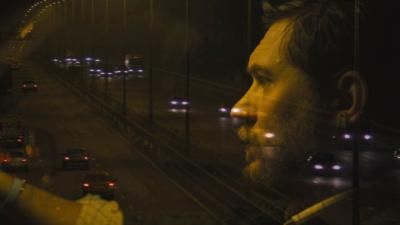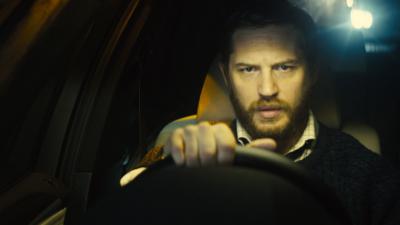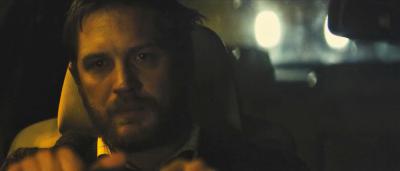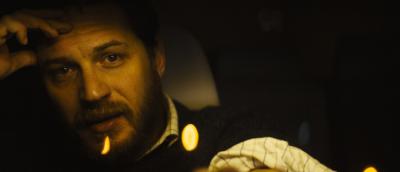By: debbie lynn elias
When I first heard about LOCKE, I had no idea what to expect from writer/director Steven Knight. A man in a car? Driving? Alone? The whole concept of setting the film just within the confines of a car may have some thinking “what the hell can you do with that”, but Knight defies any expectations of doubt, mesmerizing with both character and cinematography. A touchstone of the world today where so much of our individual and collective lives is done on the phone while driving (hands-free, of course), from Ivan Locke’s first phone call, one is captivated. And then we see Tom Hardy give a tour de force performance in what is essentially a one man show, bringing LOCKE to life, capsulizing a lifetime of events and emotions within the confines of a three hour drive. We see the man and his world at the pinnacle of success and respectability, crash, but like the Phoenix, rise, coming full circle to find hope and promise and the dawn of a new day, while he remains the calm amidst chaos, the calm in the eye of the storm. LOCKE is, in a word, MAGNIFICENT.

Ivan Locke is a strong confident man. A construction contractor/site manager, he is also a devoted husband and loving father. Family is everything. Doing the right thing is everything. Doing everything right is of the utmost importance. He carries that with him in life and at work, reinforcing those beliefs on the eve of the biggest job of a his life. A 55 story building, the tallest in the British Isles, is having concrete poured in the morning. Concrete is the foundation of any building. One bad pour, one runny slurry, an improper grade of cement to cut costs, and that building will eventually topple. Much like life. Needing everything to go smoothly, Locke has thoroughly prepared for the event. The one thing he didn’t prepare for, however, was a telephone call from his one-time site assistant with whom he had a one-night stand and now, nine months later, she calls to say she is giving birth to his child and she needs him to come to the hospital; now.
Most men would dismiss the call and focus their attention on the matters at hand. But Ivan Locke isn’t just any man. He is LOCKE. He will maintain control. He will handle it all; even if that means turning the morning concrete pour over to his less experienced and “Nervous Nelly” assistant, even if it means disappointing his two sons and a tradition of watching championship football/soccer together, even if it means confessing to his wife about his one-time indiscretion, even if it means losing his job. He is Ivan Locke. He is the foundation of his world. He will be strong. He will not crumble. Or will he?
With a steady stream of phone calls, LOCKE starts juggling all the balls amidst the darkness of night with the only light being the brightly lit blue-tooth dashboard display within the car, at times his best friend, and others, his worst nightmare. Problems mount with the job and his assistant Donal. Histrionic panic sets in with mother-to-be Bethan. Anger rages with his wife Katrina. Sadness fills his sons. And we are there in the car with LOCKE with only the faceless voices as company, telling the story of a man’s life.

As Ivan Locke, Tom Hardy is in control, commanding, a man reigning over a crumbling dominion but determined to steer the ship to where he wants it. The calm of Hardy is imposing, at times almost threatening. You are waiting for him to snap, to bend to break. Yet the only time he does is with himself. He never lets any chink in his armor be heard in his voice when speaking with others. Hardy imbues LOCKE with a powerful dignity from under which unexpected understanding of those around them as well as the character himself, emerge. The multitude of people and problems keep the story moving just as with any of our lives move throughout the course of a day or night – the wife, the whiney one night stand giving birth, his two sons, poor drunken Donal, nasty unsympathetic Gareth. And through it all, Locke maintains and provides steady calm assurances to everyone. Hardy’s self-confidence is convincing and calming yet it makes one wonder – is LOCKE trying to convince his callers or himself. It’s a rapier tightrope that Hardy walks, giving us more food for thought. Telling of the man, however, is his commitment to make things right with everything and everyone, commitment to wanting the building to have a solid secure foundation even though he’s been fired from the job. That building is a metaphor for Locke himself. He is the solid secure foundation for all those around him. Hardy’s vocal intonations and modulation are key to the balance in creating LOCKE the man, infusing tonal differentials and variables depending on who’s on the other end of the phone. It resonates deeply.
Then you add in the other voice castings. My favorites – Ruth Wilson as wronged wife, Katrina; Andrew Scott as poor cider-drinking Donal; Tom Holland as Locke’s son Eddie; and even Ben Daniels as the unfeeling and frantic boss Gareth.

Written and directed by Steven Wright, the construct of LOCKE fascinates, starting with the premise of shooting at night and the brilliance of cinematographer Haris Zambarloukus. Night shoots – on clean freeways that skirt majestic cities ablaze with lights against an inky night sky – have the capacity for gorgeous lensing and that’s precisely what Zambarloukus gives us. The play of lights, the blur and distortion, the color of tail-lights, signal lights, tinged yellow lights from buildings, the misty halogen pallor of street lamps. They mesmerize under Zambarloukus’ lens. Then you toss in tired eyes, the blur of a Robitussin-laden LOCKE and the weariness of driving in and of itself. And then you utilize everything a car has within the confines of the interior today – blue-tooth steering wheel technology, fully angular and adjustable seats, the glove compartment, the cup holder and compartment separating the front seats, the rear view mirror, the side view mirrors, the six windows on the body of the car, the angular depth of the seat upwards to the face or through the steering wheel. The result is visually stunning, three dimensional and “life” in today’s world. The visuals and use of lights and color – red, yellow, green – tell their own story metaphorically woven into the fabric of LOCKE’s life. Shot digitally on the RED Epic, the production is glossy, sleek, vibrant, providing a sumptuous look that is only enhanced by the play of exterior lighting and the multiplicity of camera angles within the car interior.
Director Wright is the first to admit that had the RED Epic camera not been available, LOCKE could not have been made. Because of the very size and nature of the Epic, during the six night course of shooting, each night cameras were repositioned and varied within the car as well as lenses being changed out, thus allowing for the fluidity and diversity of visual and emotional tones. Calls between Hardy’s Locke and other individuals were performed live during shooting, often times resulting in “ad-libbing” of dialogue due to a drop out of cell signal. Shooting the entire script each night also allowed for a continual freshness and vocal perspective much like a stage production, that on editing, is cohesively seamless.

Key to production such as LOCKE is editing and here, Justine Wright not only hits all the emotional beats, but builds tension and suspension much like a thriller while never relinquishing the “real time” sensibility and time sensitive urgency of the journey at hand.
The night is always darkest before the dawn. With LOCKE, Steven Knight and Tom Hardy give us those darkest hours and the brilliance of a new dawn. Sumptuous visuals. Mesmerizing character study in one night of a man’s life. Masterful storytelling. LOCKE is Steven Knight’s dawn, showing the world he is a consummate filmmaker.
Written and Directed by Steven Wright
Cast: Tom Hardy
Voice Casting: Ruth Wilson, Tom Holland, Andrew Scott, Ben Daniels












